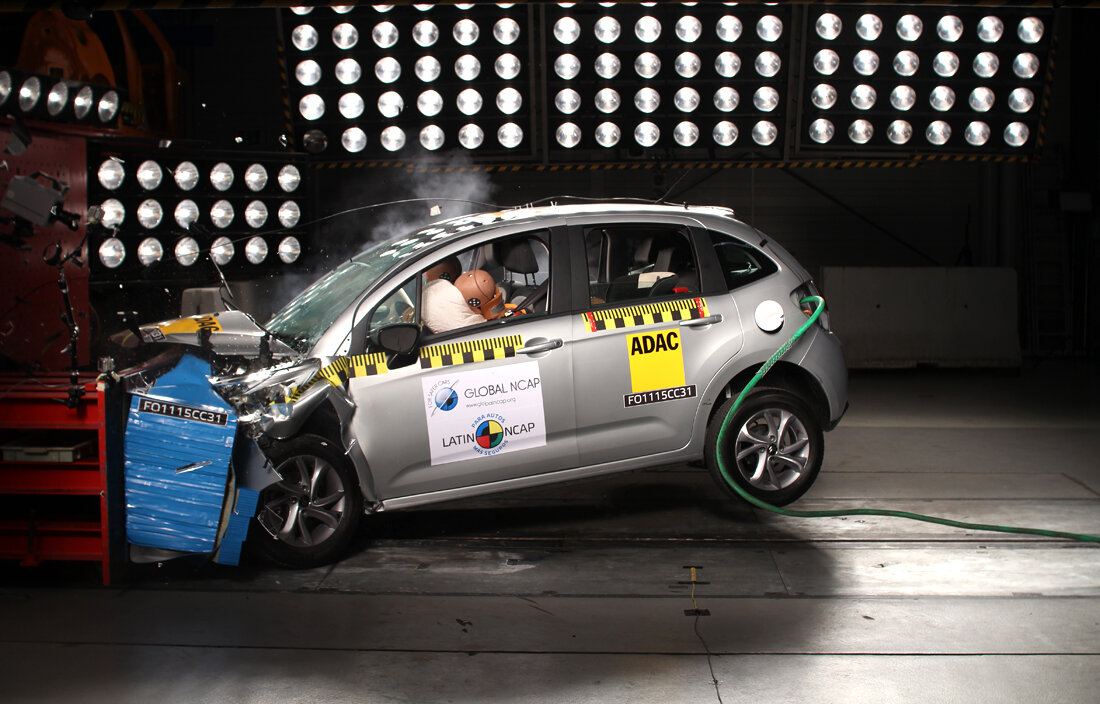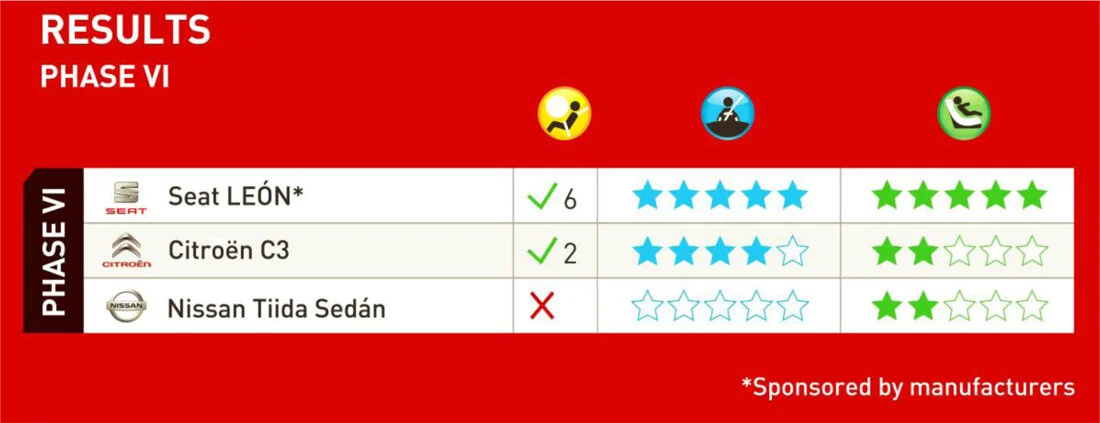Latest Latin NCAP Crash Test Results
Seat León scores five stars in Child Occupant, C3 acceptable performance and Nissan shows positive reaction
The latest results of Latin NCAP crash tests continue to show important progress in car safety in Latin America. With new support from Bloomberg Philanthropies Latin NCAP is continuing to champion improved levels of adult and child occupant protection which in many countries still fall below minimum UN safety standards. The results show an encouraging double five star rating by SEAT, an acceptable performance by Citroën and a step forward with airbag fitment by Nissan.
The Seat Leon ST (station wagon) achieved five stars in Child Occupant Protection and repeated the five stars in Adult Occupant Protection of the same model tested in 2013 by Latin NCAP. The crash structure is robust and the airbags and seatbelts protect occupants well in front and side impact collisions in both cases. The Leon fits six airbags, ABS, ESC and seatbelt reminders as standard in all versions. Only the knee airbags (standard in Europe) and side rear airbags are sold as an option. This model variant has recently been introduced in Mexico. The result applies to all the model range.
The Citroën C3 (made in Brazil) managed to narrowly achieve four stars for Adult Occupant Protection and only two stars for Child Occupant Protection. The structure of the car was rated as unstable however the fitment of two front air bags did contribute to an adequate level of protection. The C3 basic safety equipment is less well specified than the European basic version. Side airbags, ISOFIX and passenger airbag disconnection switch are not standard in the Latin American basic model. Latin NCAP, therefore, encourages PSA to further improve the level of safety fitment of the C3.
The basic version of the Nissan Tiida is currently offered without airbags and scored zero stars in Adult Occupant Protection and two stars in Child Occupant Protection. However, as a consequence of Latin NCAP’s test, Nissan has committed to stop selling the non-airbag version of the Tiida and will fit it with airbags and pretensioners. Latin NCAP welcomes Nissan’s decision which will be a positive step forward for a model that is a top ten selling car in Mexico and best seller in the region. In 2011 Latin NCAP tested the Tiida hatchback with one and two airbags that respectively obtained three and four star scores. This shows why it is so important for Nissan to discontinue selling the non-airbag version of the car.
María Fernanda Rodríguez, Latin NCAP President said: “It is very encouraging to see another five star result for Child Occupant Protection. The Seat Leon ST joins the Volkswagen Golf as the first models in Latin America to achieve five stars for both Adult and Child Protection. These are excellent results that set the standard for other manufacturers to aim for. I am also delighted that these latest tests have been made possible with help from Bloomberg Philanthropies. Latin NCAP is very proud to be working with a major philanthropy that is playing a leading role in global road safety”.
Alejandro Furas, Latin NCAP Secretary General said: “Latin NCAP is pleased to see a range of manufacturers responding positively to our test programme. Seat’s double five star result is a great achievement. Citroën’s four star result is adequate and also shows how further improvements can be made. Nissan’s decision to equip all Tiidas with airbags and pretensioners is important as it will significantly raise the model’s level of occupant protection”.
Latin NCAP is pleased to announce that more results will be released this year in July, September, November and December. In addition to our existing supporters Global New Car Assessment Programme (Global NCAP), International Consumer Research and Testing (ICRT), the Inter-American Development Bank and its Korea Poverty Reduction Fund, Latin NCAP is also being assisted in 2015 by the Bloomberg Philanthropies Global Road Safety Initiative.
About Latin NCAP
The Latin New Car Assessment Programme (Latin NCAP) was launched in 2010 to develop a regional system of independent crashworthiness and safety rating across Latin America and Caribbean. Latin NCAP replicates similar consumer testing programmes developed over the last thirty years in North America, Europe, Asia and Australia, and which have proved to be very effective in improving the safety of motor vehicles. Since 2010 Latin NCAP has published the results of more than fifty cars in six test phases.
Latin NCAP is an Associate member of Global NCAP and supports the United Nations Decade of Action for Road Safety 2011-2020 especially the vehicle pillar of the Global Plan for the Decade.
More information at www.latinncap.com






